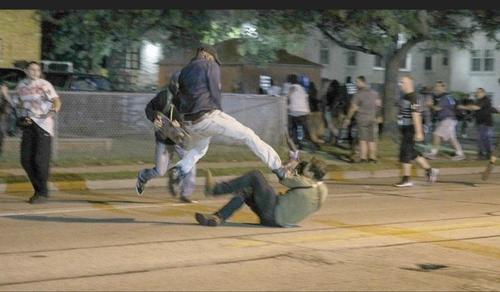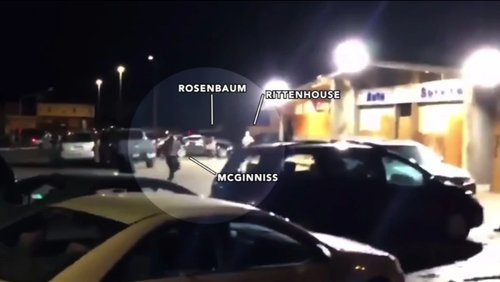![]()

On Tuesday, opening statements in the trial of Kyle Rittenhouse, an18-year-old aspiring police officer accused of fatally shooting two men and wounding a third on the night of Aug. 25, 2020, as BLM riots raged in the streets of Kenosha in response to a white-on-black police shooting.
While prosecutors have slapped the teen with two counts of homicide and one count of attempted homicide, Rittenhouse has pleaded not guilty to all charges, claiming self-defense.
Now, new footage has emerged which bolsters his case.
Before the shooting began, Rittenhouse, 17 at the time, was had arrived in Kenosha in order to help keep order and protect businesses from looting and arson.
“People are getting inured, and our job is to protect this business, and part of my job is also to help people. If there’s somebody hurt, I’m running into harm’s way. That’s why I have my rifle, because I need to protect myself obviously. But I also have my med kit,” Rittenhouse said in footage recorded before the incident.
During the course of the evening, protesters became increasingly violent against Rittenhouse and the group he was with – eventually chasing the teen down the street when protester Joseph Rosenbaum was shot dead in the parking lot of a used car dealership. Shortly thereafter, Rittenhouse could be seen defending himself on the ground from multiple attackers – when he fatally wounded another, and shot the bicep of protester Gaige Grosskreutz who had drawn a pistol and was in the process of aiming it at the teen.
https://twitter.com/fcXXXIII/status/1455582771326431238?ref_src=twsrc%5Etfw%7Ctwcamp%5Etweetembed%7Ctwterm%5E1455582771326431238%7Ctwgr%5E%7Ctwcon%5Es1_&ref_url=https%3A%2F%2Fwww.zerohedge.com%2Fpolitical%2Ffbi-sat-bombshell-footage-kyle-rittenhouse-shootingAt the time, this footage captured by journalist Brendan Gutenschwager, was all we had to go on.
Now, Human Events’ Jack Posobiec reveals that the FBI sat on potentially exonerating evidence in the Rittenhouse case, where threats against Kyle can clearly be heard before he opened fire, as well as what appear to be muzzle flashes from people shooting at the teen. We recommend playing full screen.
https://twitter.com/SavageNoMore/status/1455584590693867523?ref_src=twsrc%5Etfw%7Ctwcamp%5Etweetembed%7Ctwterm%5E1455584590693867523%7Ctwgr%5E%7Ctwcon%5Es1_&ref_url=https%3A%2F%2Fwww.zerohedge.com%2Fpolitical%2Ffbi-sat-bombshell-footage-kyle-rittenhouse-shooting
BREAKING: Human Events Daily has obtained never-before-seen FBI footage of the Kyle Rittenhouse Shootinghttps://t.co/QFAfI7mmJp pic.twitter.com/J8vOOoD3rg
— Jack Posobiec 🇺🇸 (@JackPosobiec) November 2, 2021




Why did the FBI not disclose this evidence to the defense? It is now well known the FBI had Rittenhouse under surveillance that night in Kenosha. Was Rittenhouse identified as a domestic terrorist by the FBI and as such could be surveilled?
Under what criteria did the FBI use to obtain surveillance of Rittenhouse which is believed to have been unknown to Rittenhouse or anyone else at the time other than the FBI?
It would appear that under the USA/Patriot Act gives carte blanche authority to surveil American Citizens.
SURVEILLANCE UNDER THE USA/PATRIOT ACT
It would be interesting to know if this exculpatory evidence was known to the prosecution. If they had knowledge of its existence, it would be a clear violation of the Brady Rule:
https://www.law.cornell.edu/wex/brady_rule
When the rules are followed, the Patriot Act is a powerful and useful tool. However, when placed in the hands of corrupt totalitarian advocates of the police state (i.e. Democrats) it is a threat to civil rights and personal freedoms.
My Friend TrumpWon
Conservatives were against the ”Patriot” Act 20 years ago. “Bush Republicans” said “Oh you Reagan lovers are just being “reactionary”!”! We would never have Herr Mueller persecute conservatives just for being conservatives. – Which is exactly what Bush Republican Rod Rosenstein did May ’17! – 15.5 years after the law
Hard to believe that the leftist “Compassionate Conservative” would lie? But Bush lied! He did ;precisely what we feared 20 years ago he would do!
Some history will explain why.
The Walker/Bush family has been the vanguard of the GOP left for 100 years. They never cared for conservatives. This changed to red hot hatred with “Voo Doo Economics” 41 years ago!
If Voo Doo is new to you ask and I will give details. I am old.
GWB has had a “hard on” for Ronny since he crushed GHWB in 1980. GWB still hates ‘Ronny folk. Now that he no longer wants to win elections he is more honest about his Ronny hate. READ HIS 9/11/21. Speech implying Ronny voters are American terrorists and worse than the Taliban!
Here are just some of the conservatives GWB’s boy Mueller (a registered Bush Republican BTW) persecuted for being conservative:
Mike Flynn, Paul Manafort, George Papadopoulos and Roger Stone.
These are the most famous; or if you’re a “Bush Republican” infamous!
Persecuting conservatives for being conservative is still a fact in America. The J6 political prisoners are in prison, mis treated, without habeas corpus – because they are conservative! GWB is not the only liberal that hates conservatives; not by a long shot!
BEFORE JOHN ROBERTS the act was unconstitutional! Not
NOW!
John Roberts has been GWB’s Praetorian Guard for 16 years. Just the last 12 months “NO STANDING” 11 TIMES!
Spot on, I agree 110%
When I said GWB’S hatred for President Reagan was still white hot I did not know what he was doing.
As I typed yesterday Bush sicced his STASI on another President Reagan lover!
Bush’s goons target another conservative! Links:
https://nypost.com/2021/11/05/feds-raid-project-veritas-linked-apartments-over-ashley-bidens-diary-report/
https://www.msn.com/en-us/news/politics/fbi-searches-project-veritas-associates-in-probe-over-diary-purportedly-belonging-to-biden-s-daughter/ar-AAQmUtl
https://www.nbcnewyork.com/news/local/crime-and-courts/fbi-searches-ny-homes-tied-to-project-veritas-over-ashley-biden-diary-investigation/3382741/
Bush will hate conservatives with every beat of his hart!
Gee, withholding exculpatory evidence that would benefit US political prisoners is becoming a common habit by the FBI and DOJ. So, Democrats commit crimes without fear of prosecution while political opponents and those the police state wishes to make an example of can be arrested without cause, have exculpatory evidence suppressed and even alter evidence.
Any guesses how much criticism this will receive in the liberal Democrat propaganda media?
GWB made FBI America’s liberal Stasi when he made Herr mueller Obermeister! FBI has had priority #1 for 20 years: protect liberals!
Which is precisely what they have been doing in Kenosha the last few years.
Sorry, Jarhead, but you’re about 60 years late. The FBI Stasi got a kick start under LBJ, not GWB. Mark Felt was (it is reported) Deep Throat. The FBI, under Hoover, spied on everyone, good, bad and indifferent.
The fbi under Hoover acted covertly found primarily the dirty work of democrats. Unfortunately, the patriot act codified their abuse and never so obvious as when President Trump was a candidate and in office.
Rittenhouse came from out of state, specifically to insert himself into an angry crowd openly carrying an assault rifle. Anyone who doesn’t view that as a provocation is an idiot. The result was the dubious distinction of being the only one there who killed somebody.
Grosskreutz drew his gun after Rittenhouse had already shot two people. Huber was on the ground, dying. Huber, unarmed, had been attempting to get Rittenhouse’s rifle away from him.
Seems GWB like his gofer mitt has a nome de plume. Not pierre delecto but simply “Greg”! Who knew?
Drop the narrative. The jury isn’t going to buy it.
Kenosha was Kyle’s neighborhood because he worked there. He didn’t bring a gun across state lines and every encounter he had was a clear case of self-defense.
I’m afraid the video evidence is not even remotely match your delusional myth of what happened.
The logical fallacy of what you’re proposing is laughable. As long as you’re a violent leftist terrorist you can carry a gun in a riot. If you are a honorable Patriot who is coming to serve the community as security, then there’s a double standard.
The s*** bags are dead because they tried to kill a man who knew how to use deadly force in all the right legal circumstances.
“Rittenhouse came from out of state, specifically to insert himself into an angry crowd openly carrying an assault rifle. Anyone who doesn’t view that as a provocation is an idiot.”
Hey, stupid… Rittenhouse was there cleaning graffiti off of businesses when they reacted to a leftist attack. He took his MEDICAL KIT to aid victims. He was attacked for helping the community and, luckily for him, he had his rifle. Three leftist bags of garbage got their just desserts (except for the thug that survived).
If you don’t want 17 year old’s enforcing the law and protecting the community, elect leaders that will have authorized law enforcement do it. Every bit of that is YOUR fault; the LEFT’S fault.
Now greg knows Rittenhouse’s intent.
If you openly carry an assault weapon down the street through a crowd of angry demonstrators, and it isn’t even your street, your town, or your state, you’re engaging in a deliberate provocation. Maybe Rittenhouse is too stupid to understand this.
No you’re not. If you’re breaking the law and rioting, you are deliberately provoking every other US citizen.
So you can point to the actual statute that uses the words “assault weapon”?
A trip down memory lane.
https://nypost.com/2021/05/26/biden-atf-pick-david-chipman-botches-assault-rifle-definition-at-hearing/
“If you openly carry an assault weapon down the street through a crowd of angry demonstrators, and it isn’t even your street, your town, or your state, you’re engaging in a deliberate provocation.”
What were the violent leftist rioters doing there? It wasn’t THEIR street, town or state, either. The RIOT and LOOTING is the provocation; the AR-15 is the cure. Stupid is thinking rioting and looting is acceptable behavior. We need THOUSANDS of Rittenhouse’s.
I would say the young man was quite prepared knowing what type of dirtbags and scum he was likely to encounter. His intent was to protect personal property from the mob intent upon destroying anything and everything they came into contact with.
The provocation was on the part of the pieces of shit littering the streets of Kenosha
‘An Absolute Train Wreck’: Rittenhouse Prosecutors Left Scrambling After Their Own Witness Ruins Their Narrative